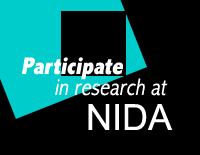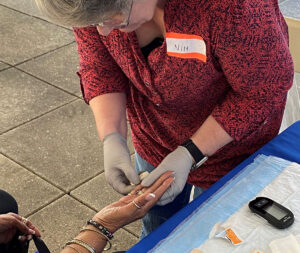Participate in research at NIDA!
For more information, call 1-800-535-8254, email us at researchstudies@nida.nih.gov, or visit researchstudies.nida.nih.gov.
How does participating in clinical research help?
Clinical research furthers our knowledge about alcohol and other substance use disorders. Through research, we can learn how to better help and treat people living with substance use disorders. NIDA is committed to the study of alcohol and drug addiction prevention, diagnosis, and treatment. To do so, we need volunteers to participate in this research. The NIDA IRP is recruiting for many different clinical research studies that gives a broad audience the opportunity to volunteer.

Max Dennis, Kathy Lightfoot, Dr. Leggio, Susan Eldridge and Dr. Farinelli take a quick photo break at our 2nd Annual NIDA Health Fair!
Who can volunteer?
NIDA is currently recruiting for a variety of clinical research studies. If you use alcohol or other drugs such as nicotine, cocaine, opioids, or marijuana, or you do not use any alcohol or drugs, you may be eligible to participate in one of our studies.
How does someone volunteer?
Getting started is easy. Anyone interested in volunteering can call the NIDA IRP Screening Team at 1-800-535-8254 for a strictly confidential phone screen. Following completion of the phone screen, an in-person screening visit will be scheduled, if appropriate.
What can volunteers expect during the in-person screening visit?
During the in-person screening visit, the volunteer receives a series of assessments and medical tests, including a variety of questionnaires, a physical exam, and a mental health evaluation. All of the information collected is reviewed by clinicians who determine if the volunteer is eligible to participate in one or more of our studies. There is no cost to the participant for the in-person screening visit.
Are volunteers compensated?
Yes, NIDA compensates volunteers for their time including travel expenses. We are located near a bus stop and offer convenient, free parking. The amount of compensation varies by study.

Physician Assistant, Kathy Lightfoot, doing a hands-on skills training during a Basic Life Support (BLS) course.
What about confidentiality?
All information we receive is kept confidential. We have a Federal Confidentiality Certificate, which means we can refuse to release volunteers’ records even if a judge asks for them. Bottom line, we will not release any information that identifies our volunteers to anyone else, unless we have permission to do so from the volunteer.
Are there any risks involved in volunteering?
The screening staff is required to explain any risks, requirements, restrictions, or possible side effects before a volunteer agrees to take part in any research study. Volunteers are encouraged to ask questions before and during participation in our research.
How are the research studies approved?
An Institutional Review Board made up of a team of clinicians, scientists, and people from the community carefully review all research for safety, ethical, and scientific merit. If an investigational drug or device (not yet approved for sale) is involved, the Food and Drug Administration (FDA) will also review the study.
What has NIDA’s research revealed?
Advances in medical science come through research. At NIDA, we have been able to increase our knowledge about how the body and brain are affected by alcohol and substance use. These advances in medical treatments are the direct results of clinical research involving research volunteers. Some specific examples are outlined below:
- Our studies have revealed more about where and how cocaine acts in the brain, including how the drug produces its pleasurable effects and why cocaine is addictive. Scientists have been able to see the dynamic changes that occur in the brain as an individual takes cocaine. They have observed the different brain changes that occur as a person experiences the “rush,” the “high,” and, finally, the craving of cocaine. They have also identified parts of the brain that become active when someone using cocaine sees or hears environmental stimuli that trigger the craving for cocaine. Because these types of studies pinpoint specific brain regions, they are critical to identifying targets for developing medications and behavioral interventions to treat cocaine addiction. Studies are under way to develop new safe techniques, such as transcranial magnetic stimulation, to help people with cocaine use disorder
- Our research has included the first and largest studies of day-to-day experience in people who are treated with medication for opioid use disorder (MOUD) such as methadone or buprenorphine (Suboxone). We have learned that successful outcomes during MOUD are not all-or-nothing; people may have occasional slips or lapses to opioid use while still doing well overall. We have shown how outcomes can be improved with additional treatments alongside MOUD, such as psychotherapy or other medications. Some of those medications seem to work by weakening the link between stress and urges to use opioids. In addition, we have shown that periods of abstinence during MOUD (especially abstinence from cocaine in people who use both opioids and cocaine) may be a window of opportunity for more easily quitting tobacco.
- Nicotine, a component of tobacco, is the primary reason tobacco is addictive, although cigarette smoke also contains other dangerous chemicals. Research has shown how nicotine acts on the brain to produce a number of effects, including findings showing that nicotine activates reward pathways—the brain circuitry that regulates feelings of pleasure. Imaging studies allow researchers to watch changes in the brain that result from smoking tobacco. An improved overall understanding of nicotine as an addictive drug has been instrumental in developing medications and behavioral treatments for tobacco addiction. Researchers have also identified new roles for genes that predispose people to tobacco addiction and predict their response to smoking cessation treatments. Studies are under way to understand if new medications may be of help in people who smoke tobacco.
- There is a critical need to better understand the biological processes that contribute to alcohol use disorder in order to develop new and effective treatments. Our research has shown how the “hunger hormone”, ghrelin, is involved not only in hunger but is a key component in alcohol use behavior. By conducting clinical trials and experimental studies, our investigations have revealed how changes in the ghrelin system effect craving for alcohol, alcohol consumption, and influence brain circuitry that regulate our motivations and behavior towards rewards. Our studies have revealed the ghrelin system as a potential new treatment target for alcohol use disorder. Researchers have also identified new roles of other hormones and peptides in alcohol use and continue to investigate their potential as new treatments for individuals with alcohol use disorder. A recent example is the work done by our scientists to understand how the hormone GLP-1 may be implicated in alcohol drinking, therefore studies are under way to study if medications like semaglutide may help people with alcohol use disorder.
Have any additional questions? Give us a call at 1-800-535-8254! Our trained screening team can answer any of your questions prior to completing a phone screen or scheduling an appointment. We’re here to help!


